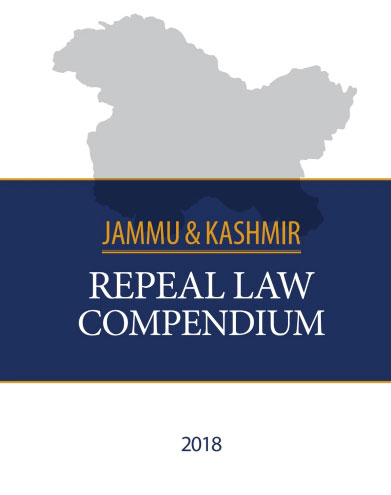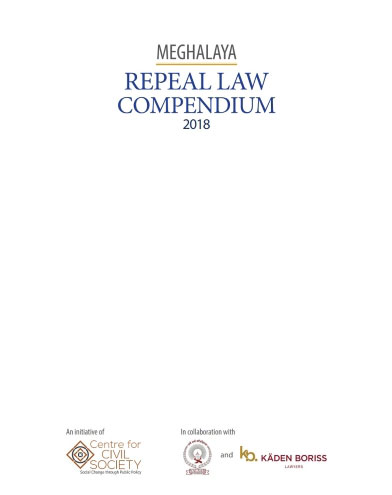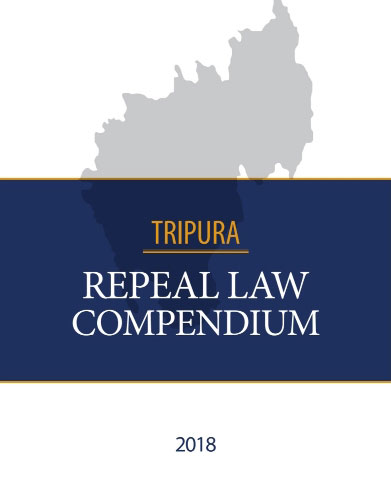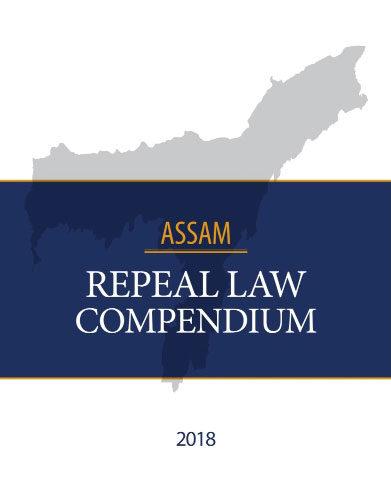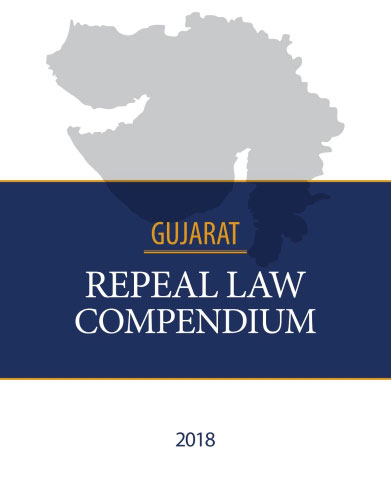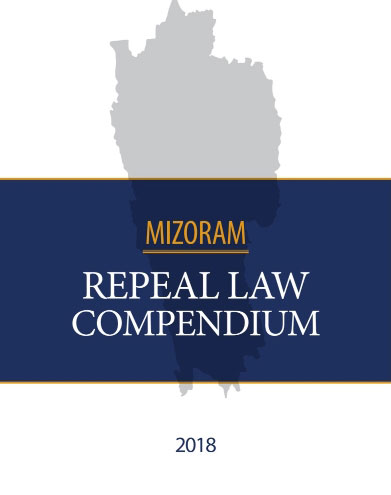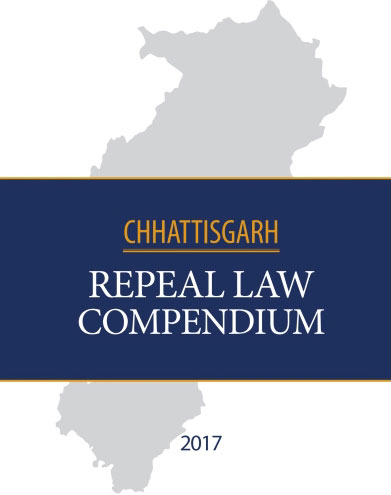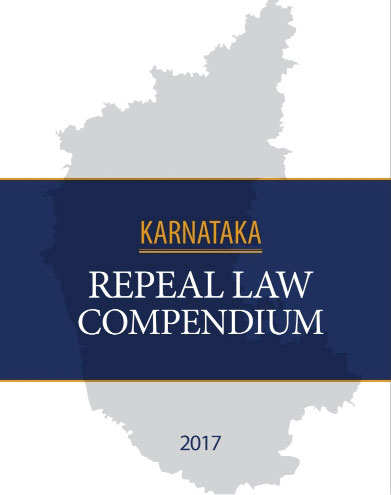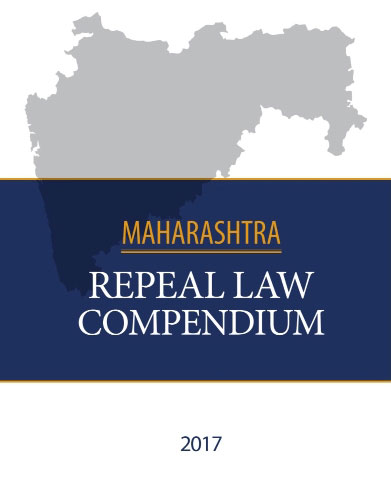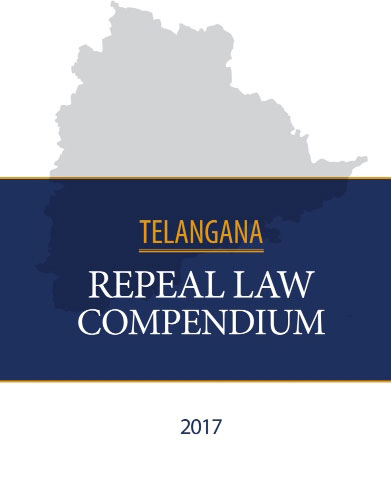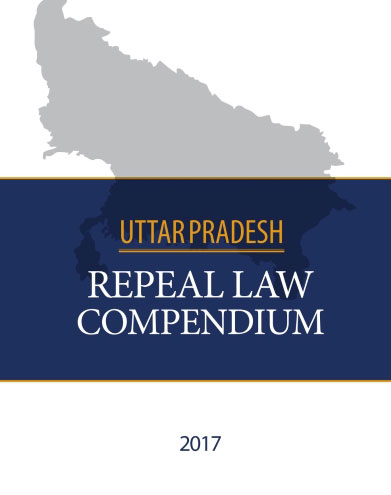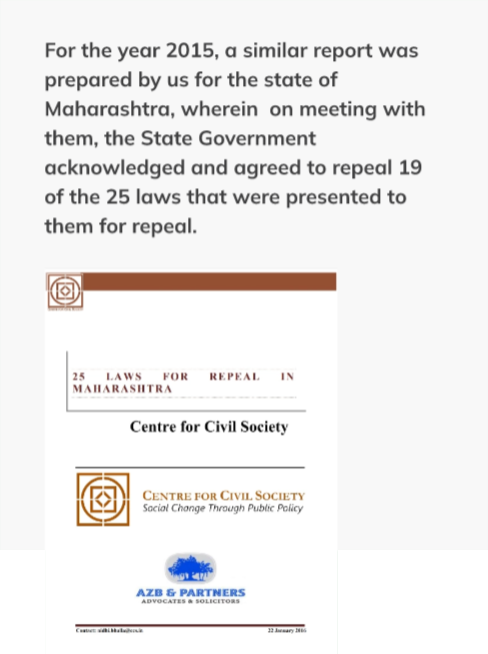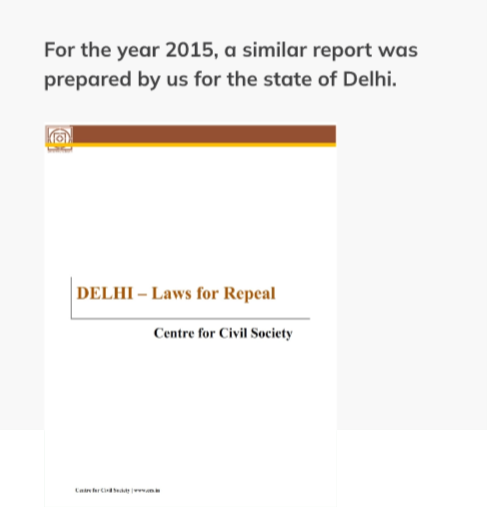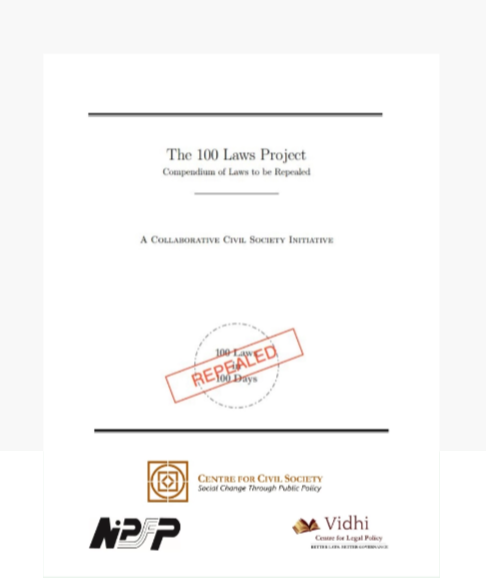The success of 'Repeal of 100 Laws' Project, conducted in partnership with National Institute of Public Finance and Policy (NIPFP) and Vidhi Centre for Legal Policy, was reflected in the successful repeal of 23 Central laws (of a total 100 suggestions) through the Repealing and Amending Bill, 2014. Further, the project was acknowledged in a Report on 'Obsolete Laws: Warranting Immediate Repeal' released by the Law Commission of India in September 2014. For the next phase of the project, CCS reached out to the State Governments of Delhi and Maharashtra, with the Maharashtra Chief Minister agreeing to repeal 19 of 25 laws.
Centre of Civil Society (CCS) initiated the 'Repeal of 100 Laws' Project in 2014 with the aim to identify laws that could be repealed on account of three reasons
Redundancy
Obsolescence in the face of new laws
Hindrance to development, governance and freedom.
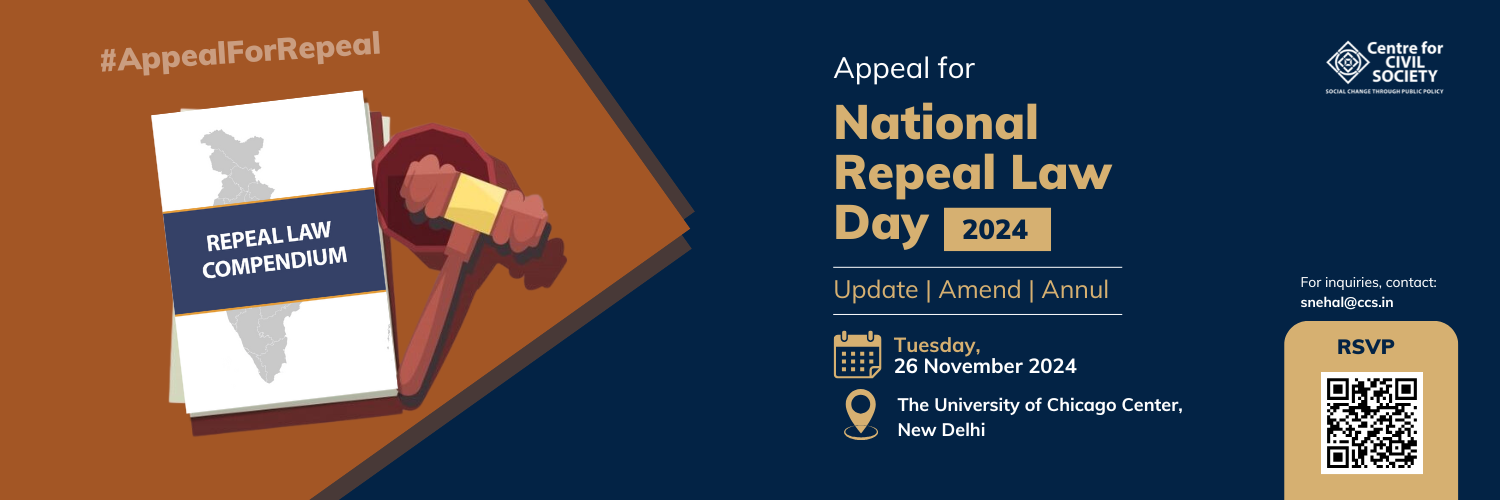
As of November 26, 2024, we celebrated a decade of successful legal reforms during the inaugural National Repeal Law Day. Key accomplishments include:
- Repeal of 216 Laws: Through extensive research and advocacy, CCS has facilitated the repeal of over 216 outdated laws from various states and the central government.
- Collaborations: Worked alongside esteemed institutions such as the National Institute of Public Finance and Policy (NIPFP) and Vidhi Centre for Legal Policy to create comprehensive state-wise compendiums for law reform.
- Successful Engagements: Established partnerships with state governments, encouraging discussions and moves towards repealing redundant laws, including the successful repeal of 19 laws in Maharashtra.
The "Repeal of Laws" event, organized by the Centre for Civil Society (CCS), highlighted the critical need to institutionalize the review and removal of outdated or redundant laws to strengthen governance and promote justice. The event also celebrated 10 years of CCS’s efforts in legislative cleanup and charted a future course for systematic law reform, including introducing sunset clauses and expanding collaborations.
The program featured a comprehensive lineup of sessions:
- Welcome Address: Delivered by Amit Chandra, CEO of CCS, the address outlined CCS’s vision for a freer society and underscored the critical need for institutionalizing legal audits to streamline
- Special Address: Niti Shikha, Board Member of CCS, provided an insightful overview of global best practices in repealing outdated laws, drawing lessons from countries like the UK, USA, and Canada.
- Presentation: Nitesh Anand, Senior Fellow at CCS, showcased a decade of impactful work by CCS in identifying and advocating for the repeal of redundant laws, highlighting key achievements and challenges.
- Panel Discussion: A thought-provoking discussion with experts explored innovative frameworks for legal reforms, focusing on strategies to
In the welcome address, Dr. Amit Chandra, CEO of the Centre for Civil Society, set the tone for the event by emphasizing the importance of streamlining India’s legal framework. He proposed recognizing National Constitution Day as “National Repeal of Laws Day” to draw attention to the burden of outdated and redundant legislation. Dr. Chandra highlighted CCS’s vision of fostering a society where individuals enjoy maximum freedom under accountable institutions and advocated for dedicating parliamentary sessions to reviewing obsolete laws. He also linked the effort to India’s aspiration for economic growth and development by 2047, emphasizing the role of an efficient legal system in achieving a “Viksit Bharat.”
In her special address, Neeti Shikha, Board Member of the Centre for Civil Society, highlighted the inefficiencies caused by India’s outdated legal framework and emphasized the urgent need for systematic law reform. Drawing on global best practices, she discussed how countries like the UK, USA, and Canada have institutionalized mechanisms to review and repeal obsolete laws, citing examples such as the UK’s Law Commission and Canada’s repeal of archaic laws like the Witchcraft Act. Neeti called for India to adopt similar practices to maintain a dynamic, fair, and efficient legal system, stressing that outdated laws undermine timely justice and social progress.
In his address, Nitesh Anand, Senior Fellow at the Centre for Civil Society, provided an overview of CCS’s decade-long efforts in identifying and repealing redundant laws. He detailed how the organization has analyzed over 530 outdated laws, leading to the repeal of 227, and collaborated with leading law schools and policymakers to create state-wise compendiums. Nitesh highlighted the challenges posed by redundant legislation, such as legal uncertainty, judicial delays, and hindered social progress, emphasizing their detrimental impact on governance and citizens' trust. He showcased key milestones, including the successful repeal of 19 laws in Maharashtra, while also addressing unresolved issues, such as the Bombay Prevention of Begging Act. Looking forward, he advocated for institutionalizing sunset clauses, expanding the program to more states, and building a robust network to drive legislative reform. His address underscored CCS’s pivotal role in streamlining India’s legal framework and envisioning a more efficient and citizen-centric system.
The centerpiece of the event was the panel discussion titled From Permanence to Progress: Institutionalizing Repealing of Laws in India. The session brought together diverse voices:
- Harsh Vardhan Tripathi, journalist and political analyst, emphasized the importance of addressing language barriers in law-making and ensuring ethical transparency in legislation.
- Hemant Batra, legal consultant, explored the philosophical relationship between law and society, urging laws to adapt to evolving societal needs.
- Niranjana Menon, senior analyst at PRS Legislative Research, highlighted state-level legislative progress and noted that only 2-3% of state bills since 2020 had focused on repealing outdated laws.
- Akash Chandra Jauhari, Vidhi Centre for Legal Policy, advocated for a centralized digital repository of laws and regular review mechanisms to maintain their relevance.
The panelists delved into the challenges of India’s over-reliance on perpetual laws and the absence of a systematic mechanism for regular legislative reviews. Harsh Vardhan Tripathi emphasized the ethical foundations of justice and the need for laws to evolve with societal aspirations. Hemant Batra discussed the importance of sunset clauses to ensure laws remain relevant over time and advocated for institutionalized mechanisms to review obsolete laws. Niranjana Menon highlighted the critical role of public consultations in legislative processes, citing examples of successful stakeholder engagement in state-level policymaking. Akash Chandra Jauhari stressed the need for centralized repositories of laws to enhance accessibility and transparency, particularly for citizens and policymakers.
The discussion culminated in several actionable recommendations aimed at reforming India’s legislative framework. Panelists advocated for establishing routine law audit mechanisms to review and update legislation, alongside implementing sunset clauses to ensure laws remain relevant over time. Emphasizing the importance of public engagement, they called for enhanced participation in the legislative process through consultations and stakeholder involvement. The creation of a comprehensive digital repository of laws was proposed to improve accessibility and transparency for both citizens and lawmakers. Additionally, they stressed the need to allocate more time in parliamentary sessions for the deliberation and passage of repeal bills, ensuring outdated laws are effectively addressed.
The event underscored the Centre for Civil Society’s pivotal role as a catalyst for legislative reform, fostering dialogue among policymakers, legal experts, and stakeholders. Key outcomes included a reinforced commitment to building robust networks of collaborators, advocating for the institutionalization of systematic repeal mechanisms, and expanding efforts to identify and analyze additional outdated laws. The discussions also highlighted the importance of promoting public awareness and discourse on the need for legislative efficiency. The insights and recommendations shared during the event will serve as a guiding framework for CCS’s continued efforts to streamline India’s legal landscape and drive citizen-centric governance.
The Appeal for National Repeal Law Day 2024 was more than an event—it was a call for legislative transformation. It underscored the urgency of creating a transparent, efficient and accessible legal system to empower citizens and strengthen governance.
As India marches toward its vision of becoming a developed nation by 2047, the lessons from this event offer a clear roadmap for policymakers and civil society. By institutionalizing the repeal of outdated laws, CCS aims to build a legal system that reflects the aspirations of a modern, dynamic India.
For more information or queries, please contact bhavya@ccs.in or riya@ccs.in

The Rule of Law forms the very foundation of a modern democratic society, defining the functionality of its public administration as well as the behavior of the private agents that constitute it. The effective codification of such a rule of law requires as its prerequisites, to be precise in enshrining the intrinsic attributes of the democracy it serves and ensuring that this is done in the simplest manner possible.
As one of the largest democracies in the world with an ever-rising population, India's enthusiasm for legislation has had, as a by- product, several statutes that with time have become obsolete, redundant or repetitive. In addition to this, there is the matter of inconsistent language and dissemination- making it difficult for an ordinary citizen to access and comprehend the plethora of legal information with ease.
This increased transaction cost coupled with glaring redundancy further breeds fertile grounds for corruption, discouraging engagement of individuals and firms with the society/ economy at large. Distorting the competitive dynamics of the economy, it leaves only those producers in the market who have surplus capital to bear costs of compliance. This, in effect, weakens the social fabric by incentivizing behavior such as corruption and cheating.
Faced with such unsettling possibilities, it is imperative that a strong movement is reckoned with the sole objective of reforming the legal structure of the country through the framing of sound laws and construction of State capacity to enable accountable enforcement.
To accomplish such a feat would require a ground-up hygiene check of existing laws, and the subsequent repealing of outdated laws, wherever necessary. This cleansing would yield a substantial impact in the functioning of the country- both economic and social.
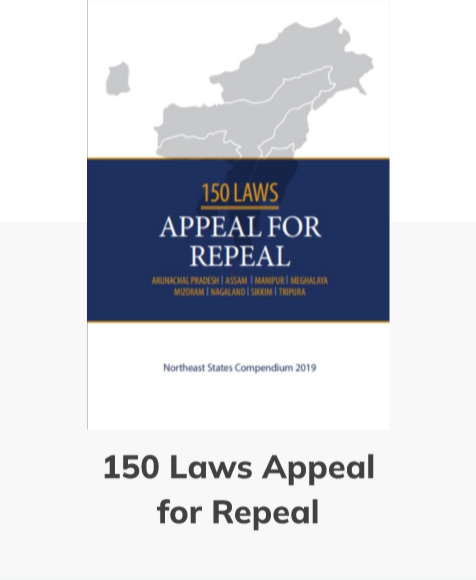
Centre for Civil Society, in an sustained effort to institutionalize the repealing of laws as a constitutional practice for the Republic of India, brought together like-minded organizations, scholars, academicians and lawyers on 25 November to reiterate the need for a Repeal Law Day.
To mark the 6th year of the Repeal Law project, the launch was followed by a panel discussion on ‘Statutory Clean Up: Institutionalisation of Repeal Law Day’. The eminent panel consisted of India’s prominent legal, policy and industry experts such as Vikramjit Banerjee, Additional Solicitor General of India, Arundhati Katju, Independent Litigator & Supreme Court Lawyer, PK Malhotra, Former Law Secretary, Ministry of Law & Justice, Maneesh Chhibber, Editorial Head, Tiranga TV, Hemant Batra, Advocate; Vice President, SAARCLAW and Founder & Counsel, Kaden Boriss Global and Dr Neeti Shikha, Head, Centre for Insolvency and Bankruptcy. The panel addressed the imperative need for a legal framework that recognises the immediate exigency to scrap or amend obsolete, redundant laws that materially impede the lives of citizens, entrepreneurs and/or the Government.
The Repeal Law Compendium was produced by CCS in collaboration with Research Partners-Symbiosis Law School, Noida (SLS), National Academy of Legal Studies & Research (NALSAR), Hyderabad, National Law School of India University (NLSIU), Bangalore, and our Legal Partners, Kaden Boriss, who ensure that the laws in the compendiums are in keeping with the evolving jurisprudence. The 2019 Compendium brings forth laws to be repealed in the states of Arunachal Pradesh, Assam, Sikkim, Manipur, Meghalaya, Mizoram, Tripura and Nagaland.
Substantiating the need to repeal laws in the Northeastern states Vikramjit Banerjee, Additional Solicitor General of India and the Former Advocate General of Nagaland in his opening address said that “Legal Pluralism; Northeast till today is a living example of that”.
Speaking on the impediment caused to individual and economic liberty by archaic laws, Hemant Batra, Founder Kaden Boriss Global said “any nation wanting to go in for rapid redistribution of existing wealth and income would go in for multiple laws. Whereas a nation looking for creation of new wealth would look for annulment of laws, it would look at eliminating barriers to rapid growth.”
Maneesh Chhibber, Consulting Editor, The Print, propounded that the separation of roles between the legislative and the judiciary is paramount, and “not just laws, time has come to repeal the constitution. If not repeal, at least amend it for our time”.
Bringing together like minded organisations, scholars, academicians and lawyers, the panel engaged in a constructive dialogue around the potential processes required for the institutionalisation of repeal of laws, and acknowledge one day in the year as the National Repeal Law Day.

For the 2018 edition of the Repeal of Laws initiative the following state compendiums have been prepared
Centre for Civil Society, in an effort to institutionalize the repealing of laws as a constitutional practice for the Republic of India, brought together like-minded organizations, scholars, academicians and lawyers to acknowledge 26 November as the Appeal for Repeal Law Day. Its objectives were
- To celebrate the diversity of our legal system and have a constructive dialogue around the process of repealing of laws
- To launch the compendiums constituting the recommended laws for repeal in the aforementioned 6 States
To mark this day, we launched the Repeal Law Compendiums constituting the recommended laws for repeal in the aforementioned 6 States. The launch was followed by a panel discussion on 'Exploring Alternatives: Institutionalization of Repeal of Laws'. Our esteemed speakers for the panel consisted of India's prominent legal and industry experts such as PK Malhotra, Former Law Secretary, Ministry of Law & Justice, Maneesh Chhibber, Editor (Investigations and Special Projects), The Print, Satya Prakash, Legal Editor, The Tribune, Tariq Anwar, Former Union Minister, Hemant Batra, Founder and Chairman, Kaden Boriss Global and Neeti Shikha, National Coordinator, Repeal of Laws initiative, Centre for Civil Society.
CCS has consistently campaigned for governmental action to repeal redundant and inconsistent laws that promote red tapism and encumber personal, social and economic freedoms. This year, we reinforced our call for the recognition of 26 November - the Constitution Day of India, as the National Repeal Law Day.
To mark this day, we launched the Repeal Law Compendium, a rigorously researched repository of obsolete laws across five states - Maharashtra, Karnataka, Chattisgarh, Telangana, and Uttar Pradesh. The launch of the Compendium was followed by a panel discussion on the Need for Institutionalisation of Repeal of Laws. Our esteemed speakers for the panel included Hemant Batra, Founder and Chairman, Kaden Boriss Global; Maneesh Chhibber, Executive Editor, DNA; Justice A P Shah, Former Chief Justice, Delhi High Court; Parth J Shah, Founder President, Centre for Civil Society; KTS Tulsi, Member of Rajya Sabha and Senior Advocate at the Supreme Court of India.
The essence of good governance is good laws. For rule of law to operate, laws must be well-written and well-coded. Laws must be precise, principles-based, and should stand the test of time. Statues that are obsolete, redundant, repetitive, or inconsistent only create chaos for the masses and provide unnecessary powers in the hands of implementing agencies, weakening the social fabric and incentivising corruption.
During the campaigns for the 2014 General Election, BJP candidate Shri Narendra Modi promised the electorate that on being elected, he would make a sincere attempt at statutory legal clean up. The commitment was that for every new law passed, 10 redundant ones would be repealed, and that in his first 100 days in office he would undertake to repeal 100 old, burdensome laws. The Bhartiya Janata Party led National Democratic Alliance Government tabled the Repealing and Amending Bill (Third) Bill, 2015 in the Lok Sabha, recommending revision of about 180 obsolete laws. It was also the commitment of Shri Ravi Shankar Prasad, that this exercise of weeding out antiquated laws would be a continuous process.
After the success of Centre of Civil Society’s Repeal of 100 laws Project (in partnership with NIPFP Macro/Finance Group and Vidhi Legal Policy Centre), wherein 100 Central laws were suggested for repeal, of which 23 were formally included in the Repealing and Amending Bill, Centre for Civil Society has launched its Repeal of laws Project- Phase II, via its report that includes laws that warrant immediate repeal in Delhi, on the grounds of them being redundant, subsumed by newer legislations, or because they pose an impediment to growth, development, good governance and individual freedom.
We believe that while statutory reform is only the beginning of a wider process of legal overhaul, it is perhaps the most important. Without sound laws, India will not provide an enabling environment, neither for citizens, nor for entrepreneurs. Repealing pointless legislation is the first step in this direction.
The essence of good governance is good laws. For rule of law to operate, laws must be well-written and well-coded. Laws must be precise, principles-based, and should stand the test of time. Statues that are obsolete, redundant, repetitive, or inconsistent only create chaos for the masses and provide unnecessary powers in the hands of implementing agencies, weakening the social fabric and incentivising corruption.
During the campaigns for the 2014 General Election, BJP candidate Shri Narendra Modi promised the electorate that on being elected, he would make a sincere attempt at statutory legal clean up. The commitment was that for every new law passed, 10 redundant ones would be repealed, and that in his first 100 days in office he would undertake to repeal 100 old, burdensome laws. The Bhartiya Janata Party led National Democratic Alliance Government tabled the Repealing and Amending Bill (Third) Bill, 2015 in the Lok Sabha, recommending revision of about 180 obsolete laws. It was also the commitment of Shri Ravi Shankar Prasad, that this exercise of weeding out antiquated laws would be a continuous process.
After the success of Centre of Civil Society’s Repeal of 100 laws Project (in partnership with NIPFP Macro/Finance Group and Vidhi Legal Policy Centre), wherein 100 Central laws were suggested for repeal, of which 23 were formally included in the Repealing and Amending Bill, Centre for Civil Society has launched its Repeal of laws Project- Phase II, via its report that includes laws that warrant immediate repeal in Delhi, on the grounds of them being redundant, subsumed by newer legislations, or because they pose an impediment to growth, development, good governance and individual freedom.
We believe that while statutory reform is only the beginning of a wider process of legal overhaul, it is perhaps the most important. Without sound laws, India will not provide an enabling environment, neither for citizens, nor for entrepreneurs. Repealing pointless legislation is the first step in this direction.
100 Laws Worthy of Repeal: A report by Centre for Civil Society, Macro/Finance Group at NIPFP and Vidhi Legal Centre, September 2014.
For rule of law to operate, laws must be precise, principles-based, well-written, well-coded and should stand the test of time. The Indian approach has often run counter to the fundamentals of good law-making. Our enthusiasm for legislation has left us with an estimated 3000 central statues, several obsolete, redundant and repetitive. The result is an environment fraught with substantial legal uncertainty, an overburdened judicial system, and pernicious rent seeking. The most important aspect of the Indian development project today is writing sound laws, and then constructing state capacity to enforce those laws. This requires large-scale statutory legal reform. In some areas, there is a need for ground-up rewriting of entire frameworks; in other areas, patient and thorough housekeeping can yield substantial impact.
The last concerted effort to clean up the statute books was in 2001. Since then, there has been no systematic weeding of dated and principally flawed laws. To help the current administration in this goal, we have identified 100 laws worthy of wholesale repeal. These laws should be repealed on account of three reasons—they are redundant having outlived their purpose, have been superseded/subsumed by more current laws, or pose a material impediment to growth, development, governance and freedom.
